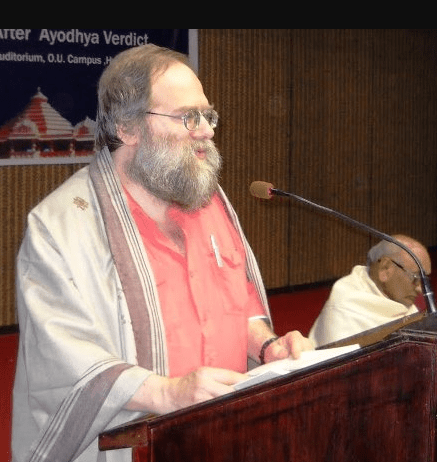Belgian Indologist Dr Koenraad Elst is both blunt and honest writer. he has written many books supporting Hinduism with facts and thorough research. His books are quoted frequently and are great reference points. His books provide are and will stand as invaluable testimony and source to express the Hindutva side of things in the most honest manner possible. Blunt but honest.
He is a writer known primarily for his writings about the debated Out of India theory and for publication of anti-Islamic literature. He has also published about multiculturalism, language policy issues, ancient Chinese history and philosophy, comparative religion, and the Aryan invasion debate
Koenraad Elst was born on 7 August 1959 in Leuven, Belgium, into a Flemish, Dutch-speaking Catholic family . However Elst he rejects Roman Catholicism and calls himself a “secular humanist”.
He graduated in Philosophy, Indo-Iranian Studies , Sinology( Chinese) at the Catholic University of Leuven. While pursuing his graduation Koenraad Elst became interested in Flemish nationalism. Between 1988 and 1992, Elst was at the Banaras Hindu University(B.H.U). During his stay at the B.H.U., he discovered India’s communal conflict issues and wrote his first book about the Ayodhya conflict.
Koenraad wrote as a columnist for a prominent of Belgian and Indian papers. He kept on visiting India frequently to India to study various aspects of coountry’s Ethno-religioous and political configuration. In process he also interviewed various Hindu and other leaders and thinkers. His research on the ideological development of Hindu revivalism earned him his Ph.D. in Leuven in 1998. His doctoral dissertation on Hindu revivalism was published as ‘Decolonizing the Hindu Mind’.
Prema Kurien, Professor of Sociology at the Maxwell School of Syracuse University, New York, US , regards ‘Elst to be unique among the VOI scholars in the regard of his having an advanced academic degree in a related field of their professional discourse’.

Elst is known for his supportive views on Indigenous Aryan theories:
Elst has published two books proposing that the Indo European language originated in India and it spread to Middle East and Europe when the Aryans, (who were indigenous to India) migrated out. These books are Aryan Invasion Debate (1999) and Asterisk in Bhāropīyasthān (2007). His theory was against some academics who have long believed it to be other way round.
According to Elst, the linguistic data are a soft type of evidence and are compatible with a variety of scenarios and the dominant linguistic theories may be compatible with an out-of-India scenario for Indo-European expansion.
Koenraad Elst is one of the few authors to use ‘Paleolinguistics’. He is deemed as one of the leading proponents of the OIT(Out of India Theory) school of thought completely debunking the prevalent Aryan Invasion Theory (AIT).
Koenraad Elst’s Big role in promoting Hindutva factually and exposing Islam:
Koenraad Elst was an editor of the New Right Flemish nationalist journal Teksten, Kommentaren en Studies from 1992 to 1995, focusing on criticism of Islam. He had been a regular contributor to reputed The Brussels Journal.
Elst is considered by many as an intellectual heir of the school of thought championed by Ram Swarup and Sita Ram Goel—the founders of the Voice of India (VOI) publishers, who claim to be righteously critical of both Christianity and Islam—Elst is a prominent author of the house and adopts the similar stance against the two religions with factual justification in his books.
Elst argues that there existed an universal spirituality among all the races and faiths, prior to the introduction of “Semitic” faiths which corrupted it.
In Decolonizing the Hindu Mind, Elst concludes that the “need for ‘reviving’ Hinduism spring from the fact that the said hostile ideologies (mostly Islam) have managed to eliminate Hinduism physically in certain geographical parts and social segments of India, and also (mostly the Western ideologies) to neutralize the Hindu spirit among many nominal Hindus.”
Koenraad Elst is a vocal proponent of Hindutva. Elst perceives Hindutva as a tool to decolonize the mental and cultural state of Indians and return to the past days of Hindu glory. He has written in support of the view that the Vedic science was highly advanced and in essence might be only truly understood by realized Hindu mystics.
Every Muslim is a Sita who must be released from Ravana’s prison. We should help Muslims in freeing themselves from Islam …
– Koenraad Elst
In Ram Janmabhoomi vs Babri Masjid, Elst makes the case for the birthplace of Rama, to correspond with the site of Babri Masjid and concurrently reiterates Islam as a fanatic bigoted faith. It was praised by L. K. Advani, former deputy Prime Minister of India.
In Ayodhya and After (1991), Elst was even more explicit in the support of the demolition and termed it an exercise in national integration which provided “an invitation to the Muslim Indians to reintegrate themselves into the society and culture from which their ancestors were cut off by fanatical rulers and their thought police, the theologians”.
In another interview, Elst claimed that it was a justified act of revenge which enforced fears of Hindu repercussion, thus curtailing Muslim violence. He calls for an Indianization of Muslims and Christians.
In his 1992 book, Negationism in India: Concealing the Record of Islam, Elst attempts to demonstrate that there exists a prohibition of criticism of Islam in India and accuses secular historians (including the likes of Romila Thapar, Bipan Chandra, Ram Sharan Sharma et al) of suffering from Hindu Cowardice wherein they ignore Muslim crimes against Hindu communities, in order to fulfill their Marxist agenda. Seems Koenraad Elst has the guts to call Spade a Spade.
Exposing propaganda of using Manu as a Weapon against Egalitarianism:
Elst’s first essay – ‘Manu as a weapon against egalitarianism’ (50 pages) should be made an essential read for all Hindutvaites, who want to defend Dharma and more importantly understand it in the present context.
Manu Smriti, Elst points out is not a caste manifesto as India’s leftists like us to believe. Its scope is vast and it is also self-contradictory. An important aspect that Elst highlights is the fact that Manu tried to explain the castes engaged in ‘defiled’ trades as a consequence of the mixing of varnas.
His latest book Still No Trace of an Aryan Invasion ( Aryan Books International, 2018) is a significant addition to the Aryan invasion/migration (AIT/AMT) and out-of-India theory (OIT) debates. There are 30 essays in this collection. These include in-depth analyses of issues related to caste, ethnicity and race, and book reviews, and rejoinders.
References:
http://indiafacts.org/interview-with-koenraad-elst-on-ayodhya/
https://swarajyamag.com/culture/why-koenraad-elst-is-important-for-hindutva
Dibhu.com is committed for quality content on Hinduism and Divya Bhumi Bharat. If you like our efforts please continue visiting and supporting us more often.😀
Tip us if you find our content helpful,
Companies, individuals, and direct publishers can place their ads here at reasonable rates for months, quarters, or years.contact-bizpalventures@gmail.com





